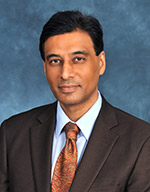11 Jan Treatment of Sleep Disorders Reduced Congestive Heart Failure Readmissions

Dr. Sunil Sharma
MedicalResearch.com Interview with:
Sunil Sharma MD, FAASM
Associate Professor of Medicine
Director, Pulmonary Sleep Medicine
Associate Director, Jefferson Sleep Disorders Center
Thomas Jefferson University and Hospitals
Philadelphia, PA 19107
Medical Research: What is the background for this study?
Dr. Sharma: Congestive heart failure (CHF) is the most common cause of hospital admission and readmissions in United States. More health care dollars are spent on CHF than any other diagnosis. A large chunk of this cost is due to hospital admission. An estimated 50% of the CHF patients are readmitted within 6 months of discharge. The recent Protection Affordable Care Act (ACA) imposes penalties on hospitals for readmissions within first 30-days. It is therefore imperative to find ways to impact the natural history of the disease.
Sleep disordered breathing is a common disorder associated with CHF. It is estimated that up to 70% of the patient with CHF may have SDB. Studies have shown that untreated SDB can worsen CHF and treatment of Sleep disordered breathing has been shown to improve heart function (ejection fraction).
Medical Research: What are the main findings?
Dr. Sharma: We hypothesized that early detection and intervention of Sleep disordered breathing in patients admitted to the hospital for decompensated CHF will reduce 6-month readmission. A total of 70 patients with decompensated CHF and SDB were enrolled in the study. The study found that CHF patients who were compliant with the therapy (CPAP) were at significantly less risk of getting readmitted to the hospital in the 6 month period post discharge. These patients also had significantly less emergency room visits.
Medical Research: What should clinicians and patients take away from your report?
Dr. Sharma: The awareness of Sleep disordered breathing in CHF patients is still sub-optimal. We recommend that all physicians taking care of CHF patients consider the possibility of SDB. Clinicians should familiarize themselves with Sleep disordered breathing and its presenting signs and symptoms. It should also be noted that many patients with CHF do not exhibit the usual symptoms of SDB. Considering the high prevalence of Sleep disordered breathing in CHF a low index of suspicion should be maintained specially patients who are clinically not doing well or having frequent hospital admissions
Patients with CHF should discuss sleep related symptoms with their health providers and explore the possibility of underlying Sleep disordered breathing.
Citation:
American Journal of Cardiology , Volume 0 , Issue 0 ,
DOI: http://dx.doi.org/10.1016/j.amjcard.2015.12.032
December 31, 2015
[wysija_form id=”5″]
Dr. Sunil Sharma (2016). Treatment of Sleep Disorders Reduced Congestive Heart Failure Readmissions MedicalResearch.com
Last Updated on January 11, 2016 by Marie Benz MD FAAD
